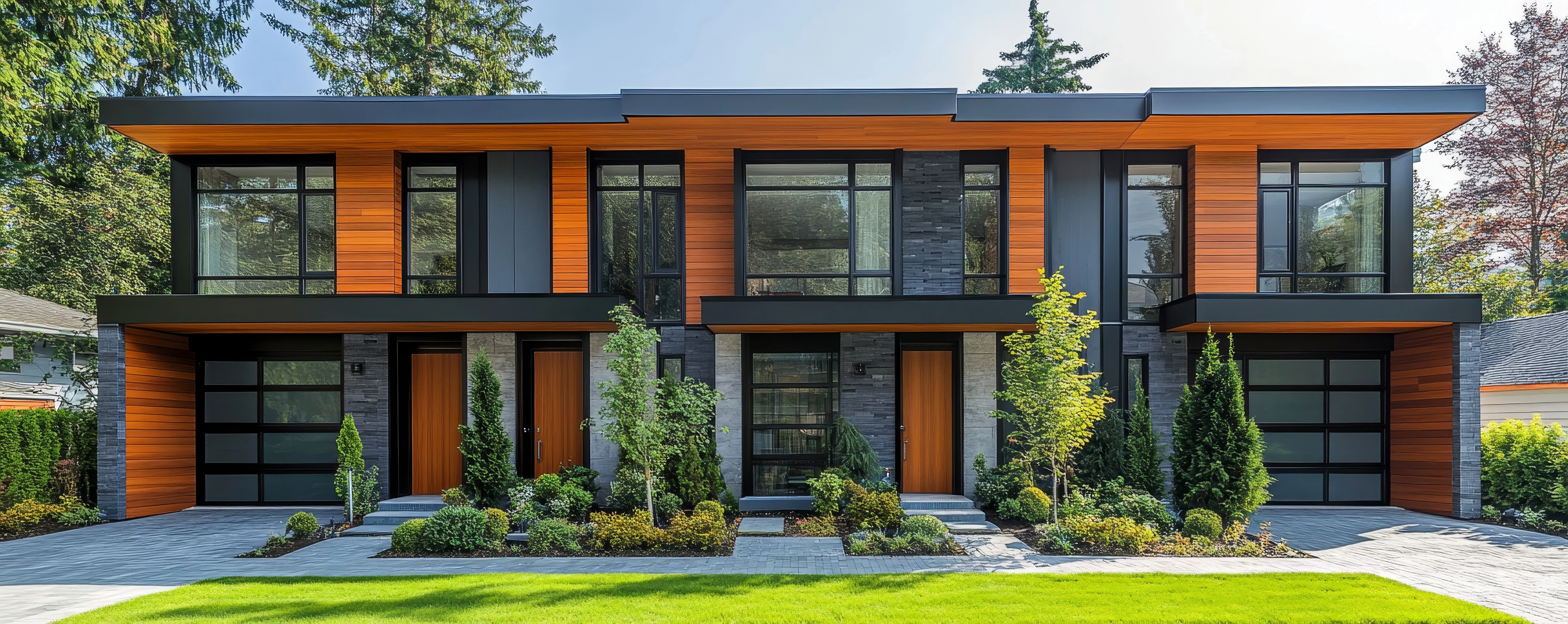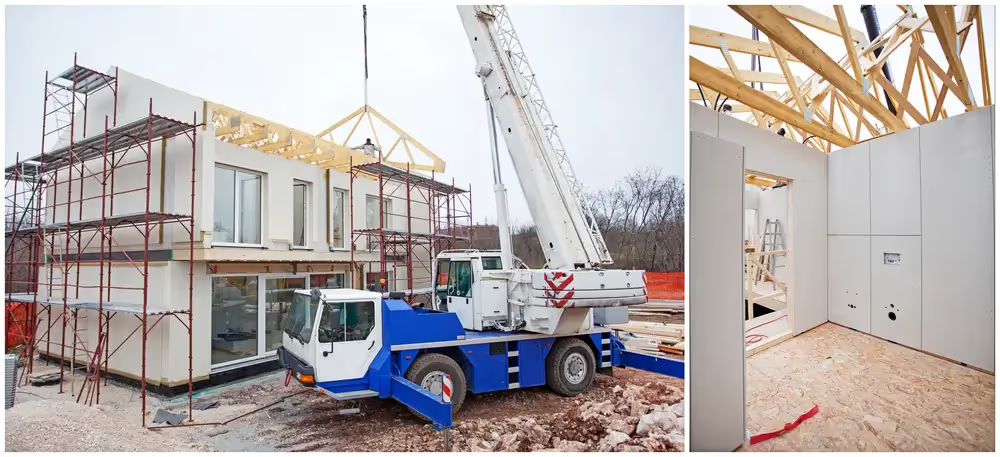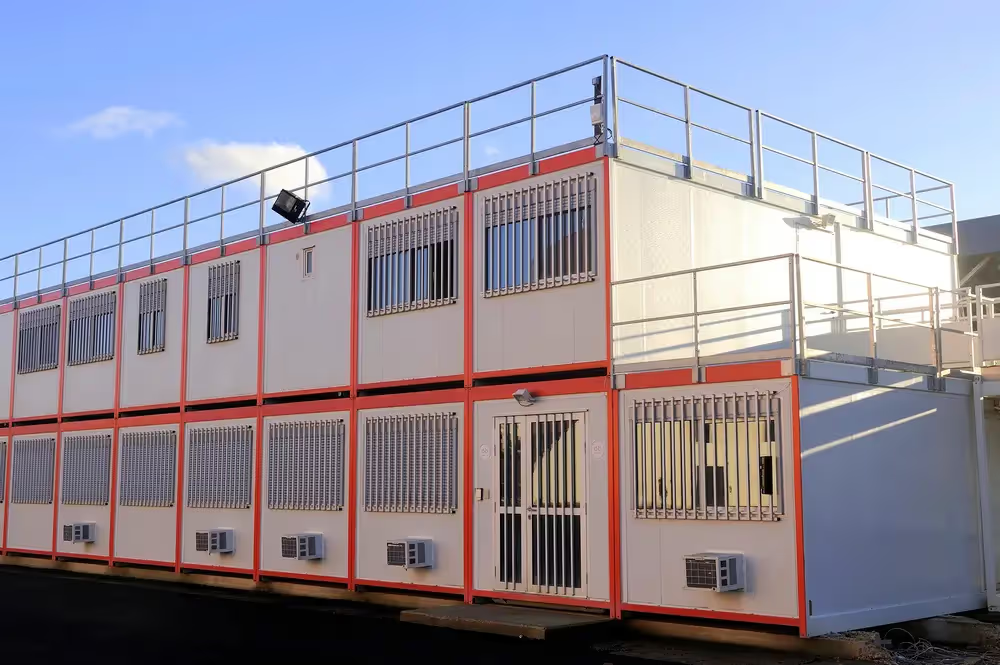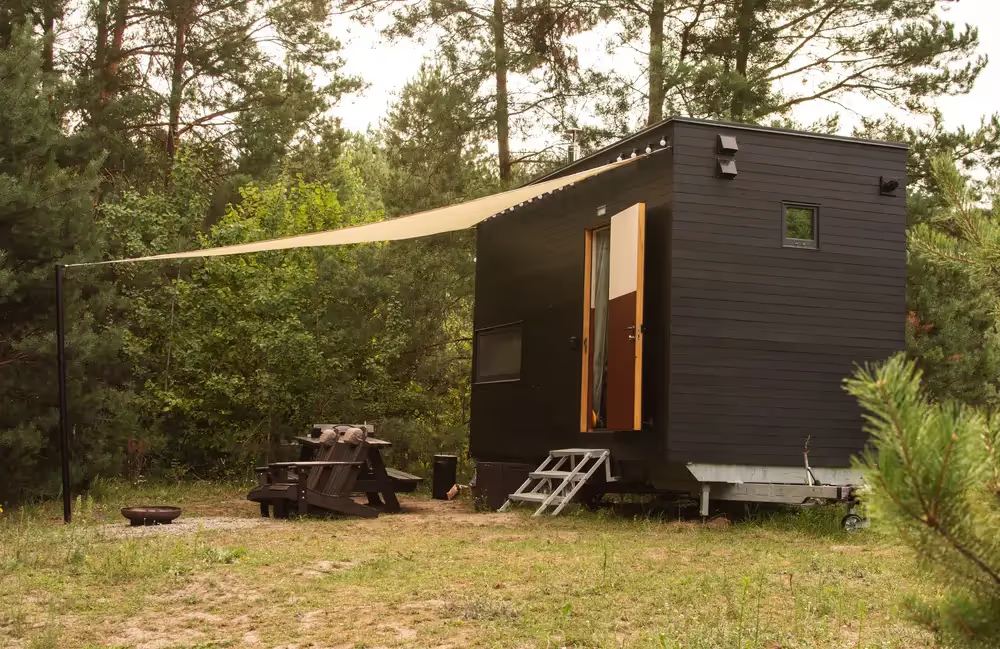

Industrialized Buildings
Our team has provided plan review and inspection services for the HUD-manufactured housing and state modular building industry for over 50 years. With experienced Engineers and certified Plan Reviewers and Inspectors, we serve the HUD-manufactured housing in all states as well as the state modular building industry in every state (and even parts of Canada) that possesses recognized modular programs. In states that do not have a recognized modular program, we can provide assistance in the plan review and/or inspections there as well. In addition, we provide consulting and guidance to new Manufacturers who are exploring the HUD Manufactured Housing Industry or the diverse state modular programs and regulations for those who need assistance with certification. We provide feedback and suggest solutions for specific design problems to help the Manufacturer accomplish compliance.
Our team has provided plan review and inspection services for the HUD-manufactured housing and state modular building industry for over 50 years. With experienced Engineers and certified Plan Reviewers and Inspectors, we serve the HUD-manufactured housing in all states as well as the state modular building industry in every state (and even parts of Canada) that possesses recognized modular programs. In states that do not have a recognized modular program, we can provide assistance in the plan review and/or inspections there as well. In addition, we provide consulting and guidance to new Manufacturers who are exploring the HUD Manufactured Housing Industry or the diverse state modular programs and regulations for those who need assistance with certification. We provide feedback and suggest solutions for specific design problems to help the Manufacturer accomplish compliance.
- Laboratory trial batch of concrete (ASTM C192)
- Concrete setting time (ASTM C403)
- Slump flow of self-consolidating concrete (ASTM C1611)
- Passing ability of self-consolidating concrete by J-ring (ASTM C1621)
- Static segregation of self-consolidating concrete (ASTM C1610)
- Bleeding of concrete (ASTM C232)
- Compressive strength (ASTM C39)
- Flexural strength (ASTM C78)
- Splitting tensile strength (ASTM C496)
- Static modulus of elasticity (ASTM C469)
- Drying shrinkage (ASTM C157, AASHTO T160)Restrained expansion (ASTM C878)
- Coefficient of thermal expansion (AASHTO T336, CRD 39)
- Flexural toughness of fiber-reinforced concrete (ASTM C1609, EN 14651)
- Tensile performance of fiber-reinforced concrete using double-punch loading (Draft ASTM)
- Cracking resistance (ASTM C1581)
- Creep (ASTM C512)
- Water-soluble chloride (ASTM C1218)
- Acid-soluble chloride (ASTM C1152)
- Rapid chloride permeability (ASTM C1202)
- Chloride diffusion coefficient (ASTM C1556, NT Build 492)Concrete formation factor (AASHTO 358)Density, absorption, and voids in hardened concrete (ASTM C642)
- Bulk electrical resistivity of concrete (ASTM C1876)
- Surface electrical resistivity of concrete (AASHTO TP95)
- Density of structural lightweight concrete made in the laboratory, equilibrium or oven dry method (ASTM C567)
- Laboratory development of strength-maturity curve (ASTM C1074)
- Petrographic exam on hardened concrete (ASTM C856, ASTM C1723)
- Air void systems in hardened concrete (ASTM C457)
- W/CM determination (NT Build 361)
- Insoluble residue analysis (ASTM C1324)
- Portland cement (ASTM C150)
- Portland limestone cement and other blended hydraulic cement (ASTM C595)
- Shrinkage-compensating cement (ASTM C845)
- Other hydraulic cement (ASTM C1157)
- Rapid hardening hydraulic cement (ASTM C1600)
- Plastic (stucco) cement (ASTM C1328)
- Fly ash and natural pozzolan (ASTM C618)
- Slag cement (ASTM C989)
- Silica fume (ASTM C1240)
- Alternative supplementary cementitious materials (ASTM C1709)
- Restrained expansion of Type K cement mortar (ASTM C806)
- Sulfate resistance of hydraulic cement (ASTM C1012)
- Sulfate resistance of Portland cement (ASTM C452)
- Expansion of hydraulic cement mortar in water (ASTM C1038)
- Effectiveness of Pozzolan & Slag Cement in Mitigating Expansion due to ASR (ASTM C441)
- Abrasion resistance (ASTM C131)
- Clay lumps and friable particles (ASTM C142)
- Cleanness value (CTM 227)
- Chloride and sulfate content (CTM 417, CTM 422)
- Crushed/fractured particles (ASTM D5821, CTM 205)
- Durability Index (ASTM D3744, CTM 229)
- Fine aggregates angularity (ASTM C1252, CTM 234, AASHTO T304)
- Flat and elongated particles (ASTM D4791)
- Moisture content of soil or rock (ASTM D2216, CTM 226)
- R Value (ASTM D2844, CTM 217)
- Sieve analysis (ASTM C136, CTM 202)
- No. 200 wash (ASTM D1140, CTM 202)
- Sieve with Hydrometer (ASTM D422, D7928, CTM 203)
- Soundness (ASTM C88)
- Specific gravity and absorption (ASTM C127, ASTM C128)
- Swell/Settlement potential (ASTM D4546)
- Bulk density and voids in aggregates (ASTM C29, CTM 212)
- Lightweight particles in aggregates (ASTM C123)
- Evaluation of alkali-silica reactivity of aggregates and aggregate-cementitious combinations (ASTM C1260, ASTM C289, ASTM C1293, ASTM C1567, ASTM C1778)
- Qualification of aggregates for use in concrete (ASTM C33)
- Qualification of lightweight aggregates for use in concrete (ASTM C330)
- Qualification of concrete aggregates per requirements of Caltrans, Greenbook, FAA, and other agencies
- Aggregate certification for deleterious materials per USACE scope
- Petrographic examination of aggregates (ASTM C295)
- Scratch hardness of aggregates (CRD-C 130)
- Resistance of rock to freezing and thawing (CRD-C 144)
- Chemical admixtures for concrete (ASTM C494)
- Air-entraining admixtures for concrete (ASTM C260)
- Mortar for unit masonry (ASTM C270)
- Packaged Dry, Hydraulic-Cement Grout Non-shrink (ASTM C1107)
- Packaged, Dry, Rapid-Hardening Cementitious Materials for Concrete Repairs (ASTM C928)
- Mortars for plain and reinforced unit masonry (ASTM C780)
- Sampling and testing grout for masonry (ASTM C1019)
- Non-shrink grout: height change after final set (ASTM C1090)
- None-shrink grout: height change at early age (ASTM C827)
- Compressive strength of mortar cubes (ASTM C109)
- Bond strength by slant shear (ASTM C882)
- Compression test and lightweight insulating concrete (ASTM C495)
- Air-dry density of gypsums, gypsum plasters, and gypsum concretes (ASTM C472)
- Compressive strength of gypsums, gypsum plasters, and gypsum concretes (ASTM C472)


Industrialized Buildings
Industrialized Buildings
Building conforming homes through manufactured housing programs
Our team has provided plan review and inspection services for the HUD-manufactured housing and state modular building industry for over 50 years. With experienced Engineers and certified Plan Reviewers and Inspectors, we serve the HUD-manufactured housing in all states as well as the state modular building industry in every state (and even parts of Canada) that possesses recognized modular programs. In states that do not have a recognized modular program, we can provide assistance in the plan review and/or inspections there as well. In addition, we provide consulting and guidance to new Manufacturers who are exploring the HUD Manufactured Housing Industry or the diverse state modular programs and regulations for those who need assistance with certification. We provide feedback and suggest solutions for specific design problems to help the Manufacturer accomplish compliance.

Our team has provided plan review and inspection services for the HUD-manufactured housing and state modular building industry for over 50 years. With experienced Engineers and certified Plan Reviewers and Inspectors, we serve the HUD-manufactured housing in all states as well as the state modular building industry in every state (and even parts of Canada) that possesses recognized modular programs. In states that do not have a recognized modular program, we can provide assistance in the plan review and/or inspections there as well. In addition, we provide consulting and guidance to new Manufacturers who are exploring the HUD Manufactured Housing Industry or the diverse state modular programs and regulations for those who need assistance with certification. We provide feedback and suggest solutions for specific design problems to help the Manufacturer accomplish compliance.
- Troubleshooting production and construction practices
- Investigation of conditions and mechanisms contributing to defects to prevent reoccurrence
- Investigation for the presence of suspected discontinuities (delaminations and porous areas)
- Validation of position of steel reinforcement and load transfer devices (dowel and tie bars)
- Development of repair recommendations, and confirmation of the soundness of repairs
- Validation of mechanical properties, air-void system, and transport properties of concrete
- Confirmation of concrete proportions and constituting materials for compliance with the approved mixture design
- Diagnosis of causes of early-age cracking, development and implementation of cracking mitigation protocol
- Development and confirmation of as-built documentation
- Condition assessment of concrete, unit masonry, plaster, and stucco
- Condition assessment of reinforcing and structural steel
- Evaluation of material conditions impacting functional and structural performance
- Durability and service life assessment(remaining services life)
- Observations and evaluations for seismic upgrade
- Technical support of planned and emergency repair and rehabilitation
- Condition monitoring
- Determination of material-related distress mechanisms affecting concrete, steel, and integrated reinforced concrete system
- Determination of material-related distress mechanisms affecting cementitious-based building materials
- Determination of distress mechanism initiating conditions
- Sampling of concrete and steel for laboratory testing, examination, and analyses
- Analyses of impacts of design, construction specifications, and practices on distress/cracking
- Assessment of repair options
- Dispute resolution and litigation support

Our team has provided plan review and inspection services for the HUD-manufactured housing and state modular building industry for over 50 years. With experienced Engineers and certified Plan Reviewers and Inspectors, we serve the HUD-manufactured housing in all states as well as the state modular building industry in every state (and even parts of Canada) that possesses recognized modular programs. In states that do not have a recognized modular program, we can provide assistance in the plan review and/or inspections there as well. In addition, we provide consulting and guidance to new Manufacturers who are exploring the HUD Manufactured Housing Industry or the diverse state modular programs and regulations for those who need assistance with certification. We provide feedback and suggest solutions for specific design problems to help the Manufacturer accomplish compliance.

We Use The Following Techniques
.webp)
Our team has provided plan review and inspection services for the HUD-manufactured housing and state modular building industry for over 50 years. With experienced Engineers and certified Plan Reviewers and Inspectors, we serve the HUD-manufactured housing in all states as well as the state modular building industry in every state (and even parts of Canada) that possesses recognized modular programs. In states that do not have a recognized modular program, we can provide assistance in the plan review and/or inspections there as well. In addition, we provide consulting and guidance to new Manufacturers who are exploring the HUD Manufactured Housing Industry or the diverse state modular programs and regulations for those who need assistance with certification. We provide feedback and suggest solutions for specific design problems to help the Manufacturer accomplish compliance.
- Visual assessment of conditions
- Mapping, photo, and video documentation
- Instrumented survey
- As-built drawings
- Drone survey
- Ground-penetrating radar (various frequency antenna)
- Impact echo
- Ultrasound pulse velocity
- Shear wave tomography
- Half-cell potential
- Electrical resistivity
- Dye penetrant
- Magnetic particles
- Surface hardness (Leeb hardness, Schmidthammer)
- Videoscopy
- Thermography
- Testing concrete for strengths, modulus of elasticity and Poisson ratio
- Optical microscopy
- Scanning electron microscopy
- Energy-dispersive X-Ray analysis
- Wet chemistry analyses for water-soluble and acid-soluble chlorides
- X-Ray fluorescent analysis
- X-ray diffraction analysis
- Mechanical testing of steel
- Physical measurements of loss of cross-section
- Analyses for chemical composition of steel
- Analysis for acid and water soluble chlorides
- Rapid-chloride permeability (USA and EN methods)
- Electrical Resistivity
- Coefficient of chloride diffusion (direct analysis, and formation factor-based estimation)
- Formation factor
- Chloride-binding isotherm
- Expansion of concrete due to residual reactivity of aggregates with alkali
- Life 365
- FIP Model Code Bulletin 34 (USACE approved method)
Our team has provided plan review and inspection services for the HUD-manufactured housing and state modular building industry for over 50 years. With experienced Engineers and certified Plan Reviewers and Inspectors, we serve the HUD-manufactured housing in all states as well as the state modular building industry in every state (and even parts of Canada) that possesses recognized modular programs. In states that do not have a recognized modular program, we can provide assistance in the plan review and/or inspections there as well. In addition, we provide consulting and guidance to new Manufacturers who are exploring the HUD Manufactured Housing Industry or the diverse state modular programs and regulations for those who need assistance with certification. We provide feedback and suggest solutions for specific design problems to help the Manufacturer accomplish compliance.
- Laboratory trial batch of concrete (ASTM C192)
- Concrete setting time (ASTM C403)
- Slump flow of self-consolidating concrete (ASTM C1611)
- Passing ability of self-consolidating concrete by J-ring (ASTM C1621)
- Static segregation of self-consolidating concrete (ASTM C1610)
- Bleeding of concrete (ASTM C232)
- Compressive strength (ASTM C39)
- Flexural strength (ASTM C78)
- Splitting tensile strength (ASTM C496)
- Static modulus of elasticity (ASTM C469)
- Drying shrinkage (ASTM C157, AASHTO T160)Restrained expansion (ASTM C878)
- Coefficient of thermal expansion (AASHTO T336, CRD 39)
- Flexural toughness of fiber-reinforced concrete (ASTM C1609, EN 14651)
- Tensile performance of fiber-reinforced concrete using double-punch loading (Draft ASTM)
- Cracking resistance (ASTM C1581)
- Creep (ASTM C512)
- Water-soluble chloride (ASTM C1218)
- Acid-soluble chloride (ASTM C1152)
- Rapid chloride permeability (ASTM C1202)
- Chloride diffusion coefficient (ASTM C1556, NT Build 492)Concrete formation factor (AASHTO 358)Density, absorption, and voids in hardened concrete (ASTM C642)
- Bulk electrical resistivity of concrete (ASTM C1876)
- Surface electrical resistivity of concrete (AASHTO TP95)
- Density of structural lightweight concrete made in the laboratory, equilibrium or oven dry method (ASTM C567)
- Laboratory development of strength-maturity curve (ASTM C1074)
- Petrographic exam on hardened concrete (ASTM C856, ASTM C1723)
- Air void systems in hardened concrete (ASTM C457)
- W/CM determination (NT Build 361)
- Insoluble residue analysis (ASTM C1324)
- Portland cement (ASTM C150)
- Portland limestone cement and other blended hydraulic cement (ASTM C595)
- Shrinkage-compensating cement (ASTM C845)
- Other hydraulic cement (ASTM C1157)
- Rapid hardening hydraulic cement (ASTM C1600)
- Plastic (stucco) cement (ASTM C1328)
- Fly ash and natural pozzolan (ASTM C618)
- Slag cement (ASTM C989)
- Silica fume (ASTM C1240)
- Alternative supplementary cementitious materials (ASTM C1709)
- Restrained expansion of Type K cement mortar (ASTM C806)
- Sulfate resistance of hydraulic cement (ASTM C1012)
- Sulfate resistance of Portland cement (ASTM C452)
- Expansion of hydraulic cement mortar in water (ASTM C1038)
- Effectiveness of Pozzolan & Slag Cement in Mitigating Expansion due to ASR (ASTM C441)
- Abrasion resistance (ASTM C131)
- Clay lumps and friable particles (ASTM C142)
- Cleanness value (CTM 227)
- Chloride and sulfate content (CTM 417, CTM 422)
- Crushed/fractured particles (ASTM D5821, CTM 205)
- Durability Index (ASTM D3744, CTM 229)
- Fine aggregates angularity (ASTM C1252, CTM 234, AASHTO T304)
- Flat and elongated particles (ASTM D4791)
- Moisture content of soil or rock (ASTM D2216, CTM 226)
- R Value (ASTM D2844, CTM 217)
- Sieve analysis (ASTM C136, CTM 202)
- No. 200 wash (ASTM D1140, CTM 202)
- Sieve with Hydrometer (ASTM D422, D7928, CTM 203)
- Soundness (ASTM C88)
- Specific gravity and absorption (ASTM C127, ASTM C128)
- Swell/Settlement potential (ASTM D4546)
- Bulk density and voids in aggregates (ASTM C29, CTM 212)
- Lightweight particles in aggregates (ASTM C123)
- Evaluation of alkali-silica reactivity of aggregates and aggregate-cementitious combinations (ASTM C1260, ASTM C289, ASTM C1293, ASTM C1567, ASTM C1778)
- Qualification of aggregates for use in concrete (ASTM C33)
- Qualification of lightweight aggregates for use in concrete (ASTM C330)
- Qualification of concrete aggregates per requirements of Caltrans, Greenbook, FAA, and other agencies
- Aggregate certification for deleterious materials per USACE scope
- Petrographic examination of aggregates (ASTM C295)
- Scratch hardness of aggregates (CRD-C 130)
- Resistance of rock to freezing and thawing (CRD-C 144)
- Chemical admixtures for concrete (ASTM C494)
- Air-entraining admixtures for concrete (ASTM C260)
- Mortar for unit masonry (ASTM C270)
- Packaged Dry, Hydraulic-Cement Grout Non-shrink (ASTM C1107)
- Packaged, Dry, Rapid-Hardening Cementitious Materials for Concrete Repairs (ASTM C928)
- Mortars for plain and reinforced unit masonry (ASTM C780)
- Sampling and testing grout for masonry (ASTM C1019)
- Non-shrink grout: height change after final set (ASTM C1090)
- None-shrink grout: height change at early age (ASTM C827)
- Compressive strength of mortar cubes (ASTM C109)
- Bond strength by slant shear (ASTM C882)
- Compression test and lightweight insulating concrete (ASTM C495)
- Air-dry density of gypsums, gypsum plasters, and gypsum concretes (ASTM C472)
- Compressive strength of gypsums, gypsum plasters, and gypsum concretes (ASTM C472)


Petrographic examination of concrete and cementitious materials (ASTM C856) including visual examination of specimens in as-received condition, stereomicroscopy of polished cross-sectional surfaces, thin section analysis using fluorescence microscopy, and phenolphthalein staining to characterize the composition and condition as well as causes of deterioration or distress in submitted samples,
Scanning electron microscopy with energy dispersive x-ray spectrometry (SEM/EDS) analysis (ASTM C1723) for elemental composition of concrete, cementitious materials, aggregate and secondary deposits,
Chloride analysis to measure acid-soluble chloride content (ASTM C1152) or water-soluble chloride content (ASTM C1218) within a material to evaluate for corrosion potential and external chloride exposure,
Hardened air void system analysis (ASTM C457) to evaluate for total air content and air void system parameters for freeze-thaw durability,
Volumetric proportioning testing (ASTM C457) to quantitatively assess proportioning of concrete in comparison with mix design or specifications,
Bulk resistivity testing (ASTM C1876) to characterize the capillary porosity of concrete mixture(s),
Petrographic examination of aggregates (ASTM C295) to identify potentially deleterious materials with potential for alkali-aggregate reactivity, staining, and/or pop-outs,
and more!
.webp)
.webp)
We are a nationally approved third-party agency under all states' established modular programs and recognized by the IIBC. Our plan review and inspection services include the following:
- residential (HUD and Modular)
- industrial
- food establishments
- mixed-use developments
- homeless shelters
- special purpose commercial modular
- recreational vehicles
- park models
- tiny homes
- MRI units
- multistory projects
- and more
Standard Practice for Petrographic Examination of Hardened Concrete
Standard Test Method for Microscopical Determination of Parameters of the Air-Void System in Hardened Concrete (Method B, Method C)
Standard Guide for Petrographic Examination of Aggregates for Concrete
Standard Guide for Examination of Hardened Concrete Using Scanning Electron Microscopy
Standard Test Method for Examination and Analysis of Hardened Masonry Mortar
Standard Test Method for Acid-Soluble Chloride in Mortar and Concrete
Standard Test Method for Water-Soluble Chloride in Mortar and Concrete
Standard Test Method for Bulk Electrical Resistivity or Bulk Conductivity of Concrete
Standard Test Method for Surface Resistivity Indication of Concrete’s Ability to Resist Chloride Ion Penetration
Standard Test Method for Flat Particles, Elongated Particles, or Flat and Elongated Particles
Standard Practice for Evaluation of Rock to be Used for Erosion Control
Standard Recommended Practice for Estimating Scratch Hardness of Coarse Aggregate Particles
Deleterious Materials Testing of Aggregate
In addition, we have the knowledge and expertise to provide architectural, structural, electrical, mechanical/HVAC, plumbing, thermal, and gas-piping system plan review and inspection services.
What sets us apart from our competition is our people and their dedication and experience. We pride ourselves on our immediate response to our client needs, whether it is meeting project deadlines or answering questions in a timely manner. We will also work with our clients to minimize costs on their designs and inspections. We pride ourselves on our quick turnaround time, pricing, and excellent customer service. Our mission is to help you realize your vision.


Why Choose Us?
Our team consists of highly trained and experienced petrographers and materials scientists.
We use state-of-the-art equipment to ensure accurate and reliable results.
Our reports are detailed and comprehensive, providing clients with a complete understanding of their concrete or cementitious specimens.
Our laboratory technicians are highly experienced with testing requirements of different pavement preservation materials. Twining laboratories consistently help public works agencies and contractors to test materials such as:
Slurry Seal
Microsurfacing
REAS
Chip Seal
The typical tests that we perform for such materials are:
Wet Track Abrasion
Asphalt content
Emulsion content
Aggregate gradation
Sand Equivalent
Consistency test (field test)
Our Balcony Inspection Services
Twining offers a range of services tailored to meet the unique needs of property owners and managers. Our services include:

E3s Housing Balcony Inspections (CP1481)
We specialize in conducting thorough inspections in compliance with CP1481 requirements, ensuring the safety of residents and compliance with local regulations.

Structural Integrity Assessments
Our team assesses the structural integrity of your balconies, identifying potential issues related to materials, connections, and load-bearing capacity.

Safety Audits
We conduct safety audits to ensure that your balconies meet the highest safety standards, including railings, guardrails, and fire safety measures.

Exterior Elevated Elements (E3s) Housing Balcony Inspection (CP1481)
An Exterior Elevated Elements (E3s) Housing Balcony Inspection (CP1481) is a comprehensive inspection of the balcony structure, including the railings, decking, and supports. The inspection is performed to identify any potential hazards or defects that could compromise the safety of the balcony.
The CP1481 inspection is based on a set of standards developed by the Canadian Construction Association (CCA). The standards cover a wide range of topics, including:
- Design and construction requirements
- Materials and workmanship requirements
- Inspection and testing requirements
We are certified E3s inspector, and we have the experience and expertise to perform comprehensive Balcony Bill Inspections. Our team is well-versed in the local, state, and national building codes, including the requirements outlined in CP1481. We provide a thorough assessment of your balcony's structural integrity, materials, and overall safety, identify potential hazards, and recommend necessary repairs or improvements.


The Design Approval Primary Inspection Agencies (DAPIAs) approves manufactured house designs for compliance with the Federal Manufactured Home Construction and Safety Standards. The Inspection Primary Inspection Agencies (IPIAs) inspects manufactured home facilities to ensure that in-plant quality assurance systems continue to build conforming homes.
We have been fully approved by HUD as a DAPIA (plan review agency) and IPIA (inspection agency) in the Federal Manufactured Housing program since its inception in 1976. Our team has served on the HUD Manufactured Housing Consensus Committee (MHCC). We maintain a good standing with HUD and IBTS and have held an "Adequate" rating on its performance for more than ten years.
Our plan review has evolved to meet our clients' needs and specifications over the years. We use state-of-the-art technologies to accommodate the fast turnaround time for approvals to help our clients keep their edge in this competitive market. They range from e-mail transactions of work orders to electronic stamping, as well as feedback on a job's status. Even with this technology, we still maintain our immediate one-on-one personal support for our clients, either in person or over the telephone. Our latest technology is real-time Virtual DAPIA. The client can access their packages via a secure website to review, search, and print any of their approved documents.
We strive to provide the closest inspector to your location. As a result, our experienced inspectors are available for inspections across the country to help you make a more affordable product.


With over 40 years of experience in the modular building industry, we not only ensure the quality of the home itself but also its compliance with all applicable codes and regulations. We have a successful partnership with the Modular Building Institute to stay abreast of consumer demands and industry news.
Our team possesses the expertise to provide architectural, electrical, mechanical/HVAC, plumbing, and gas-piping system design and/or plan review. Our experienced consulting staff can aid in the design and approval of building designs in all state’s modular programs, as well as parts of Canada. Also, our plan review staff can review code compliance for occupancy or use.
We are an approved third-party agency under all states’ modular programs, from Washington and California to New York and New Jersey. For the states that do not have a modular program, our team is available to help with preliminary plan review to assist the manufacturer with the local jurisdiction approval, in addition to performing the in-plant inspection specially.
Interstate Industrialized Building Commission” (IIBC)
We have been an IIBC-recognized and approved third party since its inception. The Interstate Industrialized Building Commission (IIBC) was created in the early 1990s when the states of Minnesota, Rhode Island, and New Jersey each enacted the Interstate Compact for Industrialized/Modular Buildings. The purpose of the compact was to streamline regulations that govern industrialized (modular) buildings from design and manufacture to delivery and installation. This also eliminated costly duplication of reviews and inspections by multiple jurisdictions. Other states that have reciprocity agreements to accept IIBC label products are North Dakota and Wisconsin. We are authorized by IIBC to provide both residential and commercial modular building inspections and plan approval services. Our IIBC-certified plan approval and inspection staff is located throughout the United States to assist and service modular manufacturers that produce products under the IIBC program.
Not only do we help solve your code-related problems, but we also keep you abreast of the latest developments in code adoptions, amendments, and interpretations with our continuous communications. This service is made available exclusively by us for our clients.


We are proud to be a longtime supporter and supplier of professional technical services to the Recreational Vehicle (RV) and Recreational Park Trailer (RPT) Industries. Nationally recognized as a design review and inspection agency for all types of factory-built structures, we are fully approved by all third-party RV and RPT code states. Further, we support the RVIA and are fully approved as a third-party inspection agency for RPT.
Additionally, we also offer design submittal CAD drafting services for all codes within the states and Canada. Our experts have first-hand knowledge of the requirements in all locations.* One way we have found to support and benefit our industry is to utilize our professional expertise on standards writing committees. We donate professional time and money each year to serve on the following committees, which directly impact the RV and RPT industries:
- NFPA National Electrical Code Panel 19, which writes NEC Articles 551 Recreational Vehicles and Recreational Vehicle Parks and NEC Article 552 Park Trailers.
- ANSI A119.5 Recreational Park Trailers.
- ANSI A119.2 / NFPA 501C Recreational Vehicles.
- ANSI / RVIA EGS-1 Engine Generator Sets.
*Note: This service is not available if we provide a recognized third party design review for your facility.


We are an approved Energy Star certifier under the Systems Buildings Research Alliance (SBRA) Energy Star programs for Manufactured Housing (HUD) and Modular Housing. For more information on the program features, please read the following.
Energy Star is a nationally recognized, voluntary program designed to identify and promote energy-efficient products, new homes, and buildings to consumers and businesses across the United States.
This program often provides qualification for rebates or utility discounts for energy-efficient housing. For updated information on incentive programs, please check the SBRA website.
Additionally, we are an approved certifier under the SBRA Certified Green with Energy Star Modular Home program.
.svg)

California was the first State to adopt regulations for fire sprinkler systems in manufactured houses. Since the inception of the program, we have held certification by the State of California Housing and Community Development Department as a Design Approval Agency and Quality Assurance Agency under the Fire Sprinkler System Program for Manufactured Housing in the State of California.
Today, our team has approved and inspected thousands of units. With a phenomenal turnaround time, quick response, and communication with the designers, manufacturers, and inspectors, we keep our clients and their products safe and in compliance with the codes without affecting the flow of the production line.
